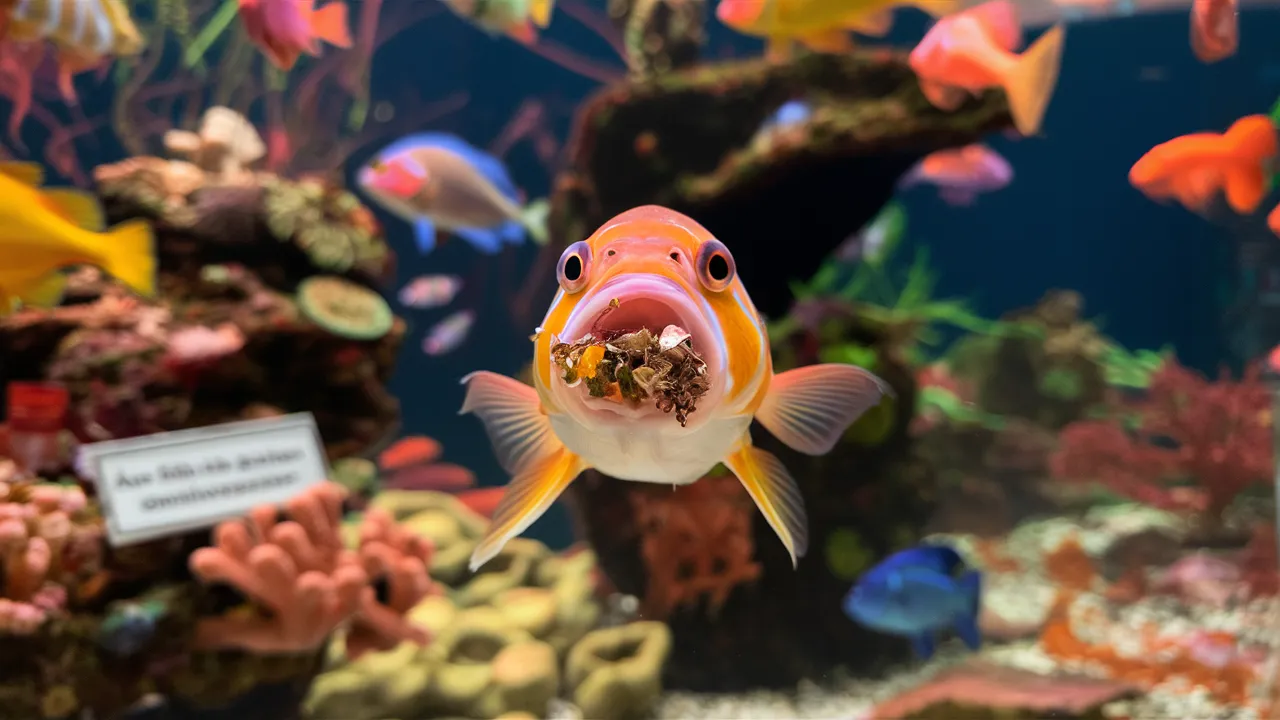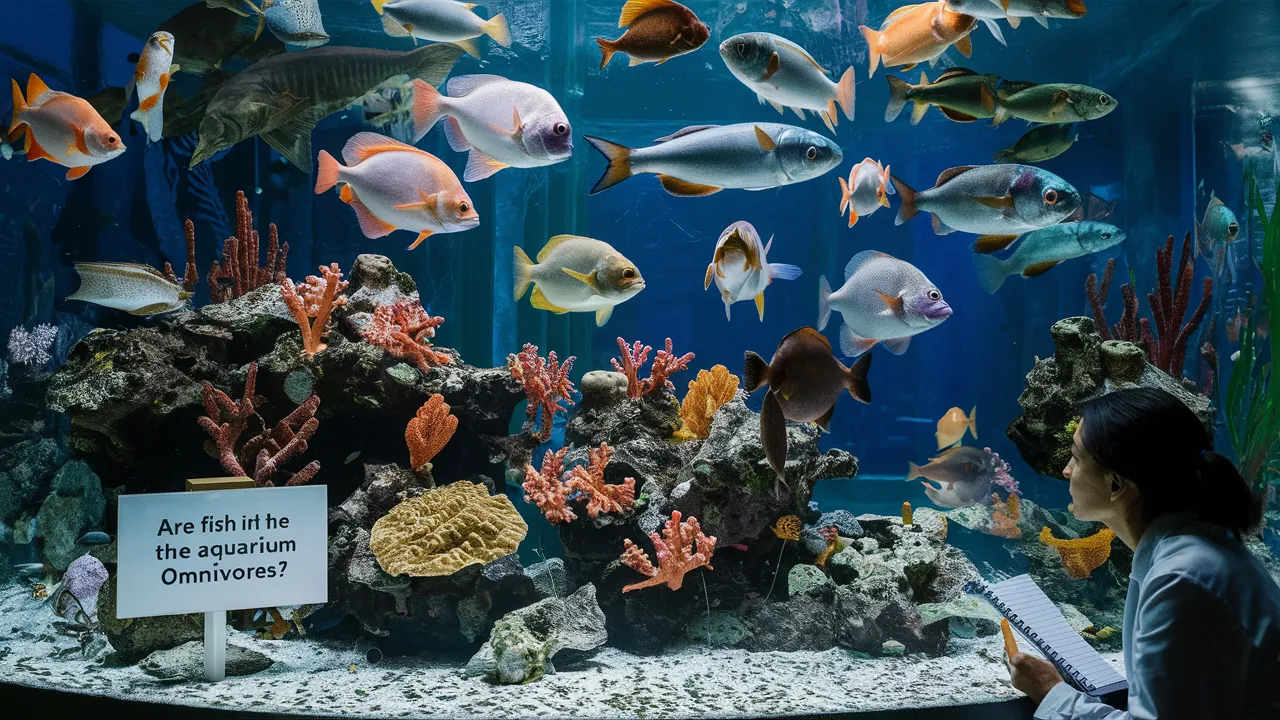Are Fish Omnivores? This question has intrigued aquarium enthusiasts and marine biologists alike. At Betta Fish Guide, we’re dedicated to unraveling the mysteries of aquatic life, including the fascinating dietary habits of fish.
Are Fish Omnivores?
Are Fish Omnivores? No, not all fish are omnivores. While some fish species are omnivores, meaning they eat both plants and animals, many are either carnivores (eating primarily meat) or herbivores (eating primarily plants).
Here’s a breakdown:
- Carnivorous fish:
Carnivores are animals that primarily consume animal matter. They have sharp teeth and powerful digestive systems designed for hunting and consuming prey.
- Herbivorous fish:
Herbivores are animals that primarily consume plant matter. They have specialized digestive systems adapted for breaking down cellulose and other plant-based compounds.
- Omnivorous fish:
Omnivores are animals that consume a diet consisting of both plant and animal matter. They have the ability to digest and obtain nutrients from a wide range of food sources.
Therefore, it’s incorrect to say that all fish are omnivores. The diet of a fish depends on its species and its specific adaptations.
Understanding Fish Diets: A Complex Tapestry
Fish diets are as diverse as the species themselves, ranging from strict herbivores to voracious carnivores. However, many fish fall somewhere in between, exhibiting omnivorous behaviors that allow them to thrive in various aquatic environments.
What Does It Mean for a Fish to Be Omnivorous?
Omnivorous fish have the ability to consume and digest both plant matter and animal-based foods. This dietary flexibility is a result of evolutionary adaptations that allow these fish to extract nutrients from a wide range of food sources.
The Evolutionary Advantage of Omnivory in Fish
Omnivory provides fish with several advantages:
- Adaptability: Omnivorous fish can survive in diverse environments by utilizing multiple food sources.
- Nutrient Balance: A varied diet ensures a more complete nutritional profile.
- Resilience: During food scarcity, omnivores can switch between food types.

Common Omnivorous Fish Species
Many popular aquarium fish are omnivores. Let’s explore some well-known examples:
- Goldfish (Carassius auratus)
Contrary to popular belief, goldfish are not strictly herbivores. These beloved pets are opportunistic omnivores, happily consuming both plant matter and small invertebrates.
- Bettas (Betta splendens)
While often considered carnivores, bettas can benefit from a diet that includes both meaty foods and plant-based matter.
- Tetras
Many tetra species, including the popular neon tetra (Paracheirodon innesi), are omnivores that thrive on a varied diet in the wild and in captivity.
- Guppies (Poecilia reticulata)
These colorful livebearers are adaptable omnivores, consuming algae, plant matter, and small crustaceans.
The Science Behind Fish Digestion
To understand why some fish are omnivores, it’s crucial to examine their digestive systems.
Digestive Adaptations in Omnivorous Fish
Omnivorous fish often possess:
- Flexible gut length: Allows for the digestion of both plant and animal matter.
- Varied enzyme production: Enables the breakdown of diverse food types.
- Adaptive teeth and jaw structures: Facilitates the consumption of different food textures.
The Role of Omnivorous Fish in Ecosystems
Omnivorous fish play a vital role in aquatic ecosystems, acting as both predators and prey.
- Ecosystem Balance and Biodiversity
By consuming a variety of food sources, omnivorous fish help maintain ecosystem balance. They can control algae populations while also serving as a food source for larger predators.
- Nutrient Cycling
Omnivorous fish contribute to nutrient cycling in aquatic environments by processing both plant and animal matter, redistributing nutrients throughout the ecosystem.

Feeding Omnivorous Fish in Captivity
For aquarium enthusiasts, understanding the omnivorous nature of their fish is crucial for providing optimal nutrition.
Creating a Balanced Diet
To cater to omnivorous fish, consider:
- Variety: Offer a mix of high-quality flakes, pellets, frozen foods, and fresh vegetables.
- Protein sources: Include foods like brine shrimp, bloodworms, and daphnia.
- Plant matter: Provide blanched vegetables like spinach, zucchini, and cucumber.
The Importance of Research
Always research the specific dietary needs of your fish species. While many are omnivores, individual nutritional requirements can vary.
Common Questions About Fish Diets
Let’s address some frequently asked questions about fish feeding habits:
How can I tell if my fish is an omnivore?
Observing your fish’s behavior and researching its species can help determine if it’s an omnivore. Look for signs such as:
- Eating both plant matter and meat-based foods
- Having a slightly elongated digestive tract (compared to strict carnivores)
- Possessing teeth adapted for grinding and tearing
Can I feed my omnivorous fish a vegetarian diet?
While omnivorous fish can consume plant matter, it’s not recommended to feed them an exclusively vegetarian diet. They require a balance of both plant and animal-based nutrients for optimal health.
Do omnivorous fish need special care in aquariums?
Omnivorous fish are generally adaptable and easier to care for than strict herbivores or carnivores. However, they still require a varied diet and appropriate water conditions to thrive.
Conclusion
The question “Are fish omnivores?” opens up a complex and fascinating area of study. While not all fish are omnivores, many species exhibit this dietary flexibility, showcasing the incredible adaptability of aquatic life.
Remember, when caring for fish, whether in a home aquarium or in conservation efforts, considering their natural dietary habits is crucial. By respecting and catering to their nutritional needs, we can ensure the health and wellbeing of these fascinating aquatic animals.

Related Posts
Are Betta Fish Nocturnal? Mystery of Betta Sleep Patterns
Shrimp Tank Mates: Choosing The Right Companions
The Most Expensive Betta Fish: A Guide To Rare & Varieties